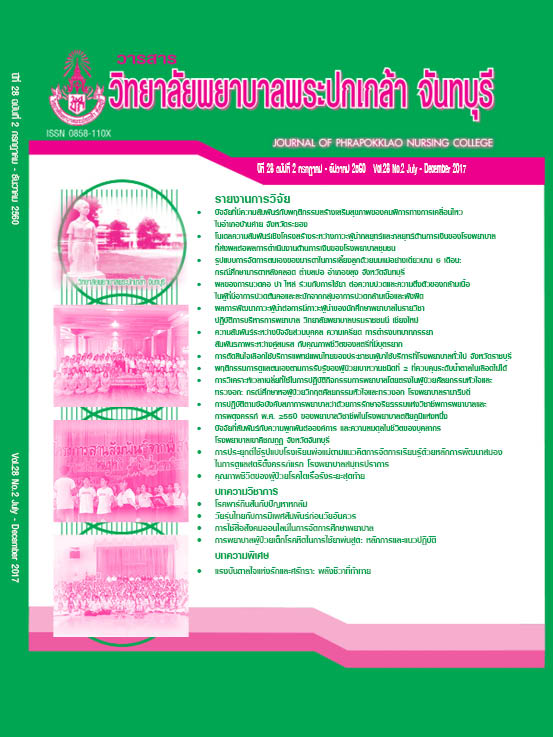The Effect of Leadership Development on Leadership of Nursing Students in Nursing Administration Practicum, Boromarajonani College of Nursing, Chiangmai
Keywords:
Leadership development, Leadership, Nursing studentsAbstract
This quasi-experimental research aimed to examine the effect of leadership development on leadership of nursing students in nursing administration practicum. The samples were composed of 103 forth year nursing students in an academic year of 2012, at Boromarajonani College of Nursing, Chiangmai and 30 clinical mentors. The research instruments consisted of an activity plan of leadership development for nursing students in nursing administration practicum, an assessment form of leadership under the perception of nursing student with the reliability of .87, and an assessment form of leadership under the perception of clinical mentors with the reliability of .82. The implementation and data collection were conducted from July, 2012 to May, 2013. Statistics used for data analysis included frequency, percentage, mean, standard deviation, paired t-test, and independent t-test.
The research results revealed that 1) for under the perception of nursing student; the overall mean scores of leadership before and after receiving leadership development were at a low level ( = 2.47, SD = .44) and a moderate level ( = 3.42, SD = .46), respectively; 2) for under the perception of clinical mentors; the overall mean score of leadership after receiving leadership development was at a moderate level ( = 3.36, SD = .42); and 3) after receiving leadership development, for under the perception of nursing student, nursing student had statistically significant higher mean score of leadership than before receiving leadership development (t = 16.070, p < .001). Also, it was found that the mean scores of leadership under the perception between nursing student and clinical mentors were not statistically significant different.
This research suggested that nursing instructors should take these findings as a guideline to develop nursing students’ leadership under their contexts to get the optimal benefits of nursing students.
References
กลุ่มงานวิชาการ วิทยาลัยพยาบาลบรมราชชนนี เชียงใหม่. (2554). สรุปการสัมมนาการจัดการเรียนการสอน ปีการศึกษา 2553. เชียงใหม่: ผู้แต่ง.
จันทิมา ฤกษ์เลื่อนฤทธิ์, จิรวรรณ อินคุ้ม, และอุ่นเรือน แก้วพินิจ. (2553). ผลของโปรแกรมสร้างเสริมสมรรถนะความเป็นผู้นำในนิสิตพยาบาล: การทดลองในนิสิตพยาบาลศาสตร์ ชั้นปีที่ 4 คณะพยาบาลศาสตร์ มหาวิทยาลัยศรีนครินทรวิโรฒ. ไทยเภสัชศาสตร์และวิทยาการสุขภาพ, 5(1), 70-75.
ทัศนีย์ จุลอดุง, และยุพิน อังสุโรจน์. (2552). การศึกษาองค์ประกอบภาวะผู้นำที่มีประสิทธิผลของหัวหน้าหอผู้ป่วย โรงพยาบาลมหาวิทยาลัยของรัฐ. วารสารสภาการพยาบาล, 24(4), 43-55.
ธานี กล่อมใจ, และคณะ. (2551). การศึกษาเปรียบเทียบภาวะผู้นำของนักศึกษาพยาบาลก่อนและหลังการฝึกปฏิบัติบทบาทผู้นำทางการพยาบาล ของนักศึกษาหลักสูตรพยาบาลศาสตรบัณฑิต ชั้นปีที่ 4 ปีการศึกษา 2550 (รายงานผลการวิจัย). วิทยาลัยพยาบาลพระจอมเกล้า จังหวัดเพชรบุรี.
พงกะพรรณ ตะกลมทอง, สมคิด สร้อยน้ำ, พิชญ์ ฉายายนต์, และชาตรี นาคะกุล. (2555). รูปแบบการพัฒนาภาวะผู้นำผู้บริหารระดับกลาง สังกัดสำนักงานคณะกรรมการการศึกษาขั้นพื้นฐาน. วารสารการบริหารการศึกษา มหาวิทยาลัยบูรพา, 6(1), 186-202.
พนิดา อาวุธ, และโศรตรีย์ แพน้อย. (2552). ความพึงพอใจตามการรับรู้ของผู้บังคับบัญชา ผู้ร่วมงาน และผู้ผ่านการอบรม ต่อสมรรถนะการปฏิบัติงานของพยาบาลเวชปฏิบัติ (การรักษาโรคเบื้องต้น) รุ่นที่ 11 ของวิทยาลัยพยาบาลบรมราชชนนี สุราษฎร์ธานี (รายงานผลการวิจัย). วิทยาลัยพยาบาลบรมราชชนนี สุราษฎร์ธานี.
พิชญากร ศรีปะโค. (2557). การพัฒนาวิชาชีพพยาบาล: การพัฒนาภาวะผู้นำทางการพยาบาล. วารสารพยาบาลทหารบก, 15(3), 1-7.
พิชาภพ พันธุ์แพ. (2554). ผู้นำกับการจัดการการเปลี่ยนแปลง. กรุงเทพฯ: โรงพิมพ์แห่งจุฬาลงกรณ์มหาวิทยาลัย.
รัตติกรณ์ จงวิศาล. (2556). ภาวะผู้นำ: ทฤษฎี การวิจัย และแนวทางสู่การพัฒนา (พิมพ์ครั้งที่ 2). กรุงเทพฯ: โรงพิมพ์แห่งจุฬาลงกรณ์มหาวิทยาลัย.
รุ่งอรุณ เกศวหงส์. (2556). การสร้างหลักสูตรฝึกอบรมพยาบาลจบใหม่ที่เข้าสู่วิชาชีพ. วารสารดุษฎีบัณฑิตทางสังคมศาสตร์ (ฉบับมนุษยศาสตร์และสังคมศาสตร์), 3(3), 53-67.
วิไล พินิจพงศ์. (2556). ภาวะผู้นำทางการบริหารการศึกษา. สืบค้น วันที่ 1 ธันวาคม 2560, จาก http://artdesignqa.blogspot.com
สถาบันพระบรมราชชนก กระทรวงสาธารณสุข. (2552). คู่มือหลักสูตรพยาบาลศาสตรบัณฑิต (หลักสูตรปรับปรุง พ.ศ. 2552). นนทบุรี: ผู้แต่ง.
สภาการพยาบาล. (2551). ข้อบังคับสภาการพยาบาลว่าด้วยข้อจำกัดและเงื่อนไขในการประกอบวิชาชีพการพยาบาลและการผดุงครรภ์ พ.ศ. 2550. นนทบุรี: ผู้แต่ง.
สภาการพยาบาล. (2553). แนวทางการพัฒนาหลักสูตรตามมาตรฐานคุณวุฒิระดับปริญญาตรี สาขาพยาบาลศาสตร์. นนทบุรี: ผู้แต่ง.
อภิรดี นันท์ศุภวัฒน์. (บ.ก.). (2560). ภาวะผู้นำและการจัดการทางการพยาบาล. เชียงใหม่: สยามพิมพ์นานา.
Bass, B. M. (1985). Leadership and performance beyond expectations. New York: The Free Press.
DuBrin, A. J. (2004). Leadership: Research findings, practice, and skills. Boston: Houghton Mifflin.
Winter, G. (2003). High performance leadership. New York: John Wiley & Sons.
Yukl, G. (2006). Leadership in organizations (6th ed.). New Jersey: Pearson Education.
Downloads
Published
How to Cite
Issue
Section
License
Copyright (c) 2017 Journal of Phrapokklao Nursing College

This work is licensed under a Creative Commons Attribution-NonCommercial-NoDerivatives 4.0 International License.
เนื้อความ ข้อมูล และรายการอ้างอิงที่ผู้เขียนใช้ในการเขียนบทความเพื่อลงตีพิมพ์ในวารสารวิทยาลัยพยาบาลพระปกเกล้า จันทบุรี ถือเป็นความคิดเห็นและความรับผิดชอบของผู้เขียน คณะผู้จัดทำวารสารไม่จำเป็นต้องเห็นพ้องด้วยหรือร่วมรับผิดชอบ
บทความที่ได้รับการลงตีพิมพ์ในวารสารวิทยาลัยพยาบาลพระปกเกล้า จันทบุรี ถือเป็นลิขสิทธิ์ของวารสารวิทยาลัยพยาบาลพระปกเกล้า จันทบุรี หากหน่วยงานหรือบุคคลใดต้องการนำส่วนหนึ่งหรือทั้งหมดของบทความไปเผยแพร่ต่อเพื่อวัตถุประสงค์ใด ๆ จะต้องได้รับอนุญาตจากบรรณาธิการวารสารก่อน



